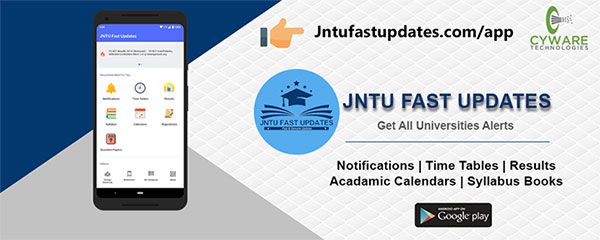JNTUK R20 2-1 Software Engineering Material/Notes PDF Download
Students those who are studying JNTUK R20 CSE Branch, Can Download Unit wise R20 2-1 Software Engineering Material / Notes / Test Books PDFs below.

JNTUK R20 2-1 Software Engineering Material/Notes PDF Download
Course Objectives: This course is designed to:
- Give exposure to phases of Software Development, common process models including Waterfall, and the Unified Process, and hands-on experience with elements of the agile process
- Give exposure to a variety of Software Engineering practices such as requirements analysis and specification, code analysis, code debugging, testing, traceability, and version control
- Give exposure to Software Design techniques
Course Outcomes: Students taking this subject will gain software engineering skills in the following areas:
- Ability to transform an Object-Oriented Design into high quality, executable code
- Skills to design, implement, and execute test cases at the Unit and Integration level
- Compare conventional and agile software methods
UNIT-1
The Nature of Software, The Unique Nature of WebApps, Software Engineering, The Software Process, Software Engineering Practice, Software Myths. A Generic Process Model, Process Assessment and Improvement, Prescriptive Process Models, Specialized Process Models, The Unified Process, Personal and Team Process Models, Process Technology.
Download UNIT-1 Material PDF | Reference-2 | Ref-3
UNIT-2
Agility, Agility and the Cost of Change, Agile Process, Extreme Programming (XP), Other Agile Process Models, A Tool Set for the Agile Process, Software Engineering Knowledge, Core Principles, Principles That Guide Each Framework Activity, Requirements Engineering, Establishing the Groundwork, Eliciting Requirements, Developing Use Cases, Building the Requirements Model, Negotiating Requirements, Validating Requirements.
Download UNIT-2 Material PDF | Reference-2 | Ref-3
UNIT-3
Requirements Analysis, Scenario-Based Modeling, UML Models That Supplement the Use Case, Data Modeling Concepts, Class-Based Modeling, Requirements Modeling Strategies, FlowOriented Modeling, Creating a Behavioral Model, Patterns for Requirements Modelling, Requirements Modeling for WebApps.
Download UNIT-3 Material PDF | Reference-2
UNIT-4
Design within the Context of Software Engineering, The Design Process, Design Concepts, The Design Model, Software Architecture, Architectural Genres, Architectural Styles, Assessing Alternative Architectural Designs, Architectural Mapping Using Data Flow, Components, Designing Class-Based Components, Conducting Component-Level Design, Component-Level Design for WebApps, Designing Traditional Components, Component-Based Development.
Download UNIT-4 Material PDF | Reference-2 | Ref-3
UNIT-5
The Golden Rules, User Interface Analysis and Design, Interface Analysis, Interface Design Steps, WebApp Interface Design, Design Evaluation, Elements of Software Qualtiy Assurance, SQA Tasks, Goals & Metrics, Statistical SQA, Software Reliability, A Strategic Approach to Software Testing, Strategic Issues, Test Strategies for Conventional Software, Test Strategies for Object-Oriented Software, Test Strategies for WebApps, Validation Testing, System Testing, The Art of Debugging, Software Testing Fundamentals, Internal and External Views of Testing, White-Box Testing, Basis Path Testing.
Download UNIT-5 Material PDF | Reference-2
e-Resources:
Text Books:
1) Software Engineering a practitioner’s approach, Roger S. Pressman, Seventh Edition, McGraw Hill Higher Education.
2) Software Engineering, Ian Sommerville, Ninth Edition, Pearson.
Reference Books:
1) Software Engineering, A Precise Approach, PankajJalote, Wiley India, 2010.
2) Software Engineering, Ugrasen Suman, Cengage.


320-x100(1).gif)

upto unit 1 the pdf is downloading but from unit 2 these are not downloading
Once check again now it’s now downloading